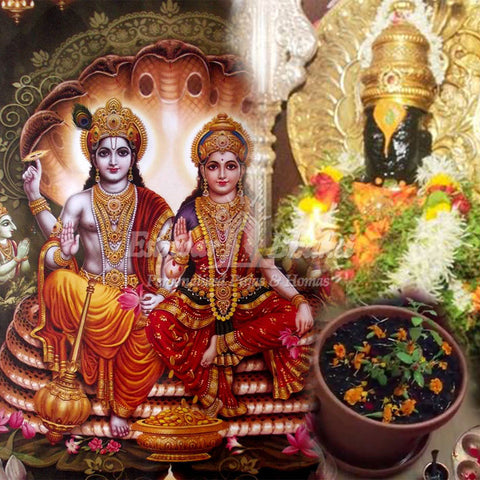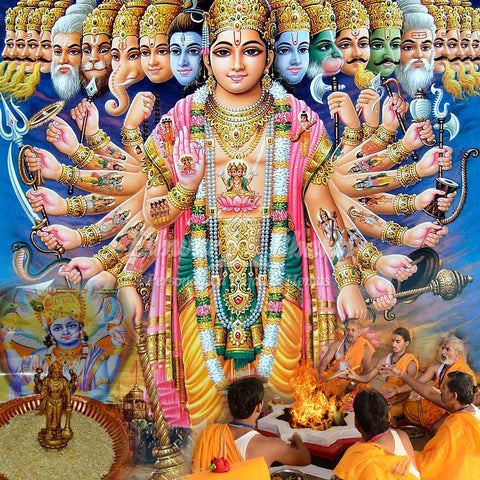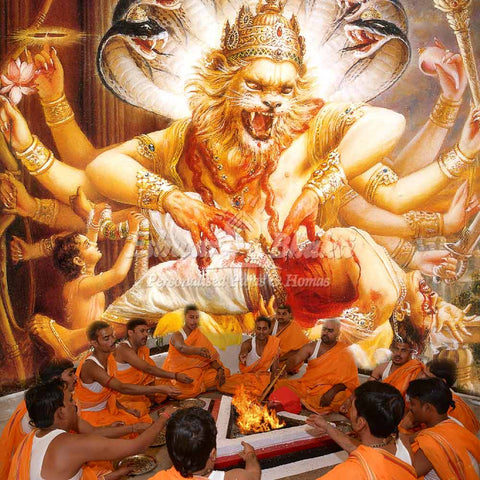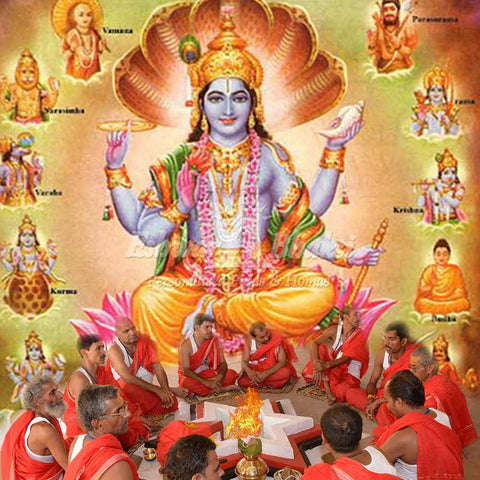Ekadashi
Ekadashi, an auspicious day in Hindu culture which is the eleventh lunar day (tithi) of each of the two lunar phases – the period of the brightening moon (Shukla Paksa) and the period of the fading moon (Krushna Paksa).
Meaning and Origin of Ekadashi: According to Hindu mythology, Ekadashi means, transforming actions of ten senses and the mind from worldly desires to God and consuming only permitted foods.
A tale from “Padma Purana” narrates the origin of Ekadashi fasting. Thousands of years ago, there was a brutal demon called Mura. He was a source of terror to the demigods as well as good people and devotees (i.e. monks and sages) on the earth. The demigods left heaven and expressed their concern to Omniscient Lord Vishnu. Because of HIS limitless mercy towards HIS devotees, Lord Vishnu immediately approached Mura for a fight which continued for 1000 years. But, looking at the unbelievable strength of the cruel demon, Lord Vishnu decided to change his strategy with a hoax and hid in a cave near the Himalayas.

When Mura saw that God is sleeping inside the cave, he wanted to kill Him. As he raised his sword to kill the Lord, suddenly a gorgeous & luminous young girl appeared from within the Lord and slew Mura with a roar. Hearing this dreadful voice, Lord woke up and saw that immensely beautiful girl and asked who she was and who killed Mura? The young girl replied with a smile that she was Maha Shakti Ekadashi emerged from the potency of the Lord. She proclaimed that she was born of Eleven Indriyas (senses) of Lord Vishnu and she had slain the antagonist Mura.
The Lord was pleased knowing that and blessed her with boons of her choice as follows:
• She shall be known as Ekadashi, as she was born of Eleven Indriyas (senses) of Lord Vishnu.
• Devotees should observe Ekadashi Vrat and control their eleven Indriyas (Senses) on this eleventh day of the lunar cycle.
• Without a doubt, fasting on Ekadashi is capable of eliminating all sins and bless people with a healthy and happier life.
• The doors of His transcendental abode shall be opened to such a soul, if a person fasts on Ekadashi or celebrates this Vrat without eating food grains such as rice, wheat, beans, etc.
Since Ekadashi has emerged from Lord Vishnu, she is an incarnation of the Lord and Hindus are celebrating all 24 Ekadashi in a year (2 each in a month) due to their immeasurable faith on Lord Vishnu.
Significance of Ekadashi : Ekadashi fasting is one of the widely considered and important Upvasa for Hindus which helps them to control their fluctuating mind as it shows a path towards peaceful, blissful, and spiritual life rather than running behind the materialist world for a mirage of happiness. Lord Shiva, in the Shiva Purana, declares, that the eleventh day of the lunar cycle (Shukla Ekadashi), is the auspicious day to fast and to worship The Supreme Lord Vishnu. It is because Ekadashi is one of the dear most devotees of the Lord.
• Ekadashi fast is a step towards practicing Tapasya (austerities) and vairagya (detachment) and to gain the right peace of mind to think of Omnipresent God.
• Modern science describes, on the eleventh day of the lunar cycle, the planet itself is in a certain state that fasting on this day creates a conducive environment for health and spiritual growth.
• Langurnadiya Purana explains, to attain the bliss from the Supreme Lord, one should refrain from rice and cereals, association with one’s spouse, and sleeping during the day.
• Due to the positions of stars and zodiacs in a certain direction, waterless fasting on Ekadashi will clean the toxins out of the body, purify the mind, body, and soul without any doubt.
Names & Importance of 24 Ekadashis :
As it is expressed in the Upanishad, most of Hindus celebrates 24 types of Ekadashi in a year, all associated with various incarnations of Supreme Brahman (Lord Vishnu). Each of them accompanies certain food rules during fast, which must be followed to develop a sattvic mind and to get closer to the Lord. Here's a list of different Ekadashis, the month in which they fall, deity they are dedicated to, and permitted food to observe a complete fast.
1. Chaitra (March-April) - Rama - Papavimchini Ekadashi (Kishna Paksha) - Kamada Ekadashi (Shukla Paksha)
One can have milk, fruits, and juice on this day, but any form of vegetables raw or cooked is not allowed.
2. Vaisakha (April-May) - Madhusudana - Varuthini Ekadashi (Kishna Paksha) - Mohini Ekadashi (Shukla Paksha)
One can eat one meal in the afternoon without any tamasic ingredients like onion or garlic. The fast must only be broken the next morning by having fruits or milk.
3 Jyeshta (May-June) - Trivikrama - Apara Ekadashi (Kishna Paksha) - Nirjala Ekadashi (Shukla Paksha)
Waterless fasting is the best for this auspicious day. The devotees are allowed to drink a few drops of water before sunset.
4. Ashaad (June-July) - Vaamana - Yogini Ekadashi (Kishna Paksha) - Shayani Ekadashi (Shukla Paksha)
One can eat saltless sattvic foods on this day.
5. Shraavana (July-August) - Sridhar - Kamika Ekadashi (Kishna Paksha) - Shravana Putrada Ekadashi (Shukla Paksha)
Devotees can eat one meal in the afternoon without rice, grains and beans.
6. Bhadrapada (August-September) - Hrisikesha - Annada Ekadashi (Kishna Paksha) - Parsva Ekadashi (Shukla Paksha)
One can have fruits, dairy products and dry fruits after the evening prayer.
7. Ashvin (September-October) - Padmanabha - Indira Ekadashi (Kishna Paksha) - Paashunkushaa Ekadashi (Shukla Paksha)
One can drink water on this auspicious day.
8. Kartik (October-November) - Damodara - Rama Ekadashi (Kishna Paksha) - Prabodhini Ekadashi (Shukla Paksha)
One can have fruits and dairy products on this day.
9. Margashirsha (November - December) - Keshava - Utpanna Ekadashi (Kishna Paksha) - Mokshada Ekadashi / Vaikunta Ekadashi (Shukla Paksha)
One can have sabudana, milk, water, fruits and sweets.
10. Pausha (December- January) - Vishnu - Saphala Ekadashi (Kishna Paksha) - Pausha Putrada Ekadashi / Vaikunta Ekadashi (Shukla Paksha)
Milk and fruits are permitted on this day.
11. Maagha (January-February) - Madhava - Shat Tila Ekadashi (Kishna Paksha) - Jaya Ekadashi (Shukla Paksha)
Different types of fruits are permitted on this day.
12. Phalguna (February-March) - Govinda - Vijaya Ekadashi (Kishna Paksha) - Amalaki Ekadashi (Shukla Paksha)
Potatoes, nuts, milk, fruits, black pepper and rock salt are allowed on this day.
13. Adhika month (once in 3 years) - Purushottama - Padmini Visuddha Ekadashi (Kishna Paksha) - Paramaa Shuddha Ekadashi (Shukla Paksha)
Fruits and dairy products are allowed on this day.
Doing fast on Ekadashi, is the highest form of love and faith towards God and to bring peace and serenity into one’s own life. “Ekadashi Vrat Katha” describes this day equal to taking 1000 times bath in the holy river Ganga and to get rid of all sins accumulated during this lifetime and past life. Only sattvic foods consisting of fruits, sweets and few dairy products are allowed to be eaten on this day.
A devotee, who is unable to observe a complete fast due to some health disorders, he/she can eat permitted foods and must refrain from rice, pulses, beans, peas, garlic, onion and other tamasic foods. Taking about non- vegetarian food is believed to sin on this auspicious day.





Comments
Excellent information